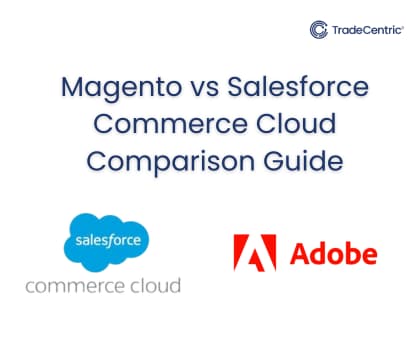Table of Contents
Selecting the right eCommerce platform is extremely important and can significantly impact a supplier’s success and a buyer’s experience. Among the many options available, two prominent contenders stand out: Magento, now known as Adobe Commerce Cloud, and Salesforce Commerce Cloud.
As suppliers strive to enhance their online presence and cater to evolving buyer expectations, understanding the nuances between these platforms is important so you can make the best decision for your business.
Whether you’re a small startup looking for cost-effective solutions or a large enterprise seeking scalability and customization, this guide can be referenced as a roadmap when deciding between Salesforce Commerce Cloud or Magento, and you will have a clear understanding of the distinctions between both platforms.
Overview of Salesforce Commerce Cloud and Magento
Salesforce Commerce Cloud and Magento are two leading eCommerce platforms designed for businesses of all sizes, with each offering a suite of tools and features to create, manage, and grow online stores.
Both platforms have different use cases and offer various pricing plans. Let’s explore more about each and what to consider when choosing between Salesforce Commerce Cloud and Magento for your business.
Overview of Salesforce Commerce Cloud
Salesforce Commerce Cloud is a powerhouse in the eCommerce platform industry and is widely recognized for its enterprise-grade features and scalability. Its strengths lie in its ability to deliver personalized shopping experiences across multiple channels, including web, mobile, social, and physical stores.
Leveraging the capabilities of Salesforce, Commerce Cloud integrates seamlessly with other Salesforce products, enabling businesses to deliver personalized and unified experiences across multiple touchpoints.
Salesforce Commerce Cloud’s cloud-based architecture ensures flexibility and accessibility, empowering suppliers to adapt to evolving market demands with ease. With features like AI-driven insights and predictive analytics, Salesforce Commerce Cloud stands out for its focus on enhancing customer engagement and driving sales.
Pros of Salesforce Commerce Cloud
- Intuitive Interface for Business Users: Salesforce Commerce Cloud features an intuitive, user-friendly interface designed for ease of use across teams. Non-technical users can manage workflows and content without relying on developer support, accelerating execution across departments.
- Fully Managed Infrastructure: Unlike open-source platforms such as Magento, Salesforce Commerce Cloud eliminates the burden of ongoing maintenance. Businesses benefit from a fully hosted solution that reduces IT overhead and ensures continuous updates and improvements.
- Seamless Salesforce Ecosystem Integration: Native integration with Salesforce CRM and Marketing Cloud empowers organizations to unify customer, sales, and commerce data on one platform, enabling smarter selling and more personalized customer experiences.
- Enterprise-Grade Extensibility: The platform supports a robust marketplace of pre-built integrations and third-party apps, allowing for fast and flexible expansion as business needs evolve. From payment gateways to loyalty programs, Salesforce’s partner ecosystem covers the full commerce stack.
- Built for Scalability and High Performance: Salesforce Commerce Cloud is engineered for enterprise-scale operations. Whether you’re managing seasonal traffic surges or global site rollouts, the platform delivers consistent performance and uptime across regions and channels.
- Fast Time to Value: With no software or hardware installation required, teams can onboard and launch faster. Businesses can focus on strategy and growth while Salesforce handles infrastructure and deployment.
- Mobile-Optimized Experience: The Salesforce mobile app enables on-the-go access to key CRM and commerce functions, allowing teams to manage workflows and customer engagement from any device, at any time.
Overview of Magento
Magento is an open-source eCommerce platform renowned for its flexibility, scalability, and comprehensive feature set. It has evolved into one of the most popular platforms globally, powering a vast array of online stores from small businesses to large enterprises.
Magento offers competitive flexibility and customization capabilities, making it suitable for businesses of all sizes and industries. Its modular architecture allows developers to extend and customize the platform to meet specific business requirements, whether it’s designing unique storefronts, integrating third-party extensions, or implementing complex business logic.
Pros of Magento (Adobe Commerce)
- Built for Scale and High Performance: Magento is well-suited for enterprise-grade operations, offering the scalability needed to support high-traffic, high-volume ecommerce environments without compromising performance.
- Extensive Ecosystem of Extensions and Themes: With a large global developer community, Magento boasts thousands of third-party extensions and themes. This ecosystem empowers businesses to tailor their storefronts with precision and integrate virtually any feature or capability.
- SEO-Centric Architecture: Magento was built with SEO in mind. It provides granular control over URL structures, metadata, and site indexing, giving businesses the tools they need to drive organic visibility and improve search rankings.
- Deep Customization Capabilities: Magento is an open-source platform (in its Community edition) and highly configurable. Businesses have complete flexibility to adapt workflows, UI, and backend logic to meet complex business requirements.
- Enterprise-Ready for Large Catalogs and Complex Operations: Magento excels in managing large catalogs, complex pricing models, and multi-site or multi-language setups, making it a strong fit for multinational brands or manufacturers with varied product lines.
- Advanced and Custom Reporting Options: The platform includes robust reporting and analytics features, offering insights into sales trends, customer behavior, and operational performance. It also integrates well with external BI tools for deeper analysis.
Magento vs Salesforce Commerce Cloud Features
When it comes to features for Magento vs Salesforce Commerce Cloud, both eCommerce platforms offer a wide range of features to support online businesses, including catalog management, order processing, and marketing tools. Magento excels in flexibility and customization, making it a preferred choice for businesses with unique requirements or complex product offerings.
Here’s a closer look at each feature set for both Magento and Salesforce Commerce Cloud:
Catalog Management
Magento and Salesforce Commerce Cloud both provide tools for managing product catalogs, including product listings, categories, attributes, and pricing.
- Salesforce Commerce Cloud supports comprehensive catalog management features, enabling businesses to organize and merchandise their products effectively across various channels.
- Magento’s catalog management capabilities offer extensive customization options, allowing businesses to create complex product hierarchies and attribute sets tailored to their specific needs.
Order Processing
Both Magento and Salesforce Commerce Cloud streamline the order processing workflow, from order placement to fulfillment and shipment.
- Salesforce Commerce Cloud provides similar order processing capabilities, emphasizing integration with Salesforce’s CRM tools for order management and customer service.
- Magento’s order processing features include customizable workflows, multiple payment and shipping options, order tracking, and integration with third-party logistics providers.
Marketing Tools
Magento and Salesforce Commerce Cloud offer a suite of marketing tools to help businesses attract, engage, and retain customers.
- Salesforce Commerce Cloud provides advanced marketing automation capabilities, leveraging data insights and AI-driven personalization to deliver targeted campaigns, product recommendations, and personalized experiences across channels.
- Magento’s marketing features include promotional pricing, discounts, coupons, email marketing, and search engine optimization (SEO) tools to drive traffic and conversions.
Flexibility and Customization
- Salesforce Commerce Cloud provides extensive customization options so developers can create highly tailored solutions to meet specific business needs. Its architecture and development tools allow complex integrations, customizations, and unique storefront experiences.
- Magento is extremely flexible and open-source. Custom modules, extensions, and storefront configurations are limitless.
Need a B2B eCommerce Solution?
Magento vs Salesforce Commerce Cloud: Hosting
When considering hosting options for Magento, Adobe Commerce, and Salesforce Commerce Cloud, suppliers must weigh factors such as performance, scalability, and security.
- Magento offers both cloud-based and self-hosted deployments, giving businesses the flexibility to choose an environment that aligns with their infrastructure preferences and IT resources. This approach is ideal for companies seeking greater control over hosting configurations and customizations.
- Salesforce Commerce Cloud is entirely cloud-based, running on Salesforce’s infrastructure. It offers built-in scalability, enterprise-grade reliability, and reduced maintenance responsibilities, making it a strong choice for organizations looking to streamline operations and minimize internal IT demands.
Salesforce Commerce Cloud hosting depends on your business requirements, technical expertise, and preferences regarding control and the ability to scale.
Which Is Best for You?
Choosing between Salesforce Commerce Cloud and Magento (Adobe Commerce Cloud) involves considering various factors to align with your business objectives and requirements.
Ultimately, the decision hinges on your business’s priorities, whether it’s easy integration with CRM tools and advanced analytics or advanced flexibility and customization options. Evaluating your specific requirements and long-term objectives is crucial in determining which platform best aligns with your eCommerce strategy and growth plans.
Magento and Salesforce Commerce Cloud Assistance

With TradeCentric, you can access hundreds of integrations for more than 75 eCommerce systems and 150 ERP/eProcurement solutions. We proudly partner with Magento and Salesforce Commerce Cloud and work closely with both providers. No matter which eCommerce platform you use, our Platform is purpose-built to streamline the integration and transaction processes. Reach out to us for more information.




